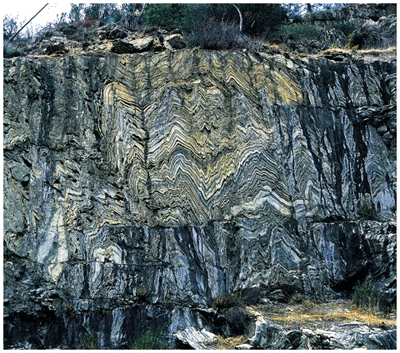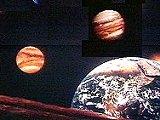Remote Ready Biology Learning Activities has 50 remote-ready activities, which work for either your classroom or remote teaching.
Serendip is an independent site partnering with faculty at multiple colleges and universities around the world. Happy exploring!

|

|
...if you know how to read a rock,
then what you'll see is this:
What it was. Where it's been. What fires it's seen.
So what I have to say is this:
if you're looking for a metaphor, and the topic is [learning]...
forget butterflies.
Think rocks.
Comments from the forum:
Teresa: The play was fun and brought to light the issues and delights (!) of working together with parents in educating their children. OVerall, it was a useful week. I feel expanded as a person and educator....The prevailing observation for the week for me is how expansive learning lightens the learning process, slays learning and personal boundaries (even those generally unperceived), and opens again my inherent sense of wonder and inquiry.
Cynthia: I WAS GLAD TO HAVE THE OPPORTUNITY TO EXCHANGE IDEAS WITH SOME OF THE PEOPLE IN HIGHER EDUCATION AND TO GLEAN RESOURCES.
Judith: This week was a roller coaster ride of events. We learned a variety of new things and ways to use them in the classroom. Some of our behaviors had to be changed. We started the week in the cosmos and ended the week on the earthly plain of K-16 trying to solve the problems that existed since the cosmos began....I am changing my behavior and the way I do things.
Antoinette: Teachers who want to be successful are willing to try multiple formats to motivate and reach their students....The world as I know it is only the world to me...(no one else has my exact perspective.)...I am hoping to make learning ... fun, inquisitive, interacitve, knowledge based, reality focused, and a safe envirnment for my students...
Margaret: The best part of the experience has been the sharing...Question: How do college level teachers view us, especially urban teachers? How do you evaluate our skills? How do our skills compare to teachers from other districts? I expected to see many more districts represented at the Institute. Are we off in a separate category?
From The New York Times Education Life (July 31, 2005):
No Child Left Behind, with its emphasis on standards and hard data, has placed national policy in direct conflict with the prevailing approach of many colleges, where the John Dewey tradition of progressive education holds sway, marked by a deep antipathy toward testing....."There is a disconnect of professors of education just not being capable of equipping future teachers with the practicalities to be successful."
Consider this week's breaking news:

From The New York Times (July 30, 2005):
Planet or Not, Pluto Now Has Far-Out Rival
Astronomers announced yesterday that they had found a lump of rock and ice that was larger than Pluto and the farthest known object in the solar system....The new object - as yet unnamed, but temporarily known as 2003 UB313 - is now 9 billion miles away from the Sun, or 97 times as far away as Earth and about three times Pluto's current distance from the Sun....What is most surprising is that the orbit of the planet is sharply skewed to most of the rest of the solar system. The orbits of most planets lie close to the same plane as Earth's, known as the ecliptic plane. The orbit of 2003 UB313 is tilted by 44 degrees. "That blows my mind....Getting something up that high is very hard"....The new planet could have been easily discovered much sooner if anyone had looked at that part of the sky. "It's because no one looks that far off the ecliptic....No one expects to have an inclination that high"....a defender of Pluto's planetary status said his initial inclination would be to classify 2003 UB313 as a planet. He wondered whether it had an atmosphere and what sort of geological processes generated its apparently bright surface. "The kinds of questions we would ask about this object would be planetlike questions"....Astronomers will also have to figure out how the body made it to its current skewed orbit. "It makes Pluto seem less weird."
When you build new tools of perception, you discover new universes....It's always been that way, it's always going to be that way. And it also means that there's no definitive answers. (Journey Through the Universe, by Ron Cowen )
To begin, then, with the Oxford English Dictionary On-line, and the "story" behind "hypothesis":
thesis: from Greek "putting, placing"=a proposition, affirmation
(Originally and properly, according to ancient writers,
"The setting down of the foot or lowering of the hand in beating time,
and hence...the stressed syllable of a foot in a verse; a stressed note in music.")
hypo: from Greek "under, beneath, below"= foundation, base (hence, basis of an argument).
1. A subordinate particular thesis involved in a general thesis; a particular case of a general proposition.
2. A proposition put forth or stated (without any reference to its correspondence with fact) as a basis for argument...
Since hypo- is the opposite of hyper- ("over, above, beyond"),
let me propose a neologism to guide our play today:
hyperthesis --> going over/above/beyond our observations:
exploring what we cannot see, but want, or need, or wish for,
adding meaning to what we see,
what Loren Eiseley describes in "The Starthrower" as
"the widening ring of human choice"....
I want to tell you now the tale of the evolution of two different stories,
(a cosmic one this morning, a human one this afternoon),
and offer you (and your students) the opportunity to re-write them a third time.
The Creation of the Universe?
The Heliocentric Cosmology of the Dogon?Britt's story behind her story
Spend the next 1/2 hour designing a lesson plan in which the students write a creation story,
based on...conscious observations? data? unconscious awareness? desire? what else?
Then write your own.
Record in the forum what you have come up with, and we'll read these before lunch.

In the Afternoon: Bringing it Home
Mark Twain. Life on the Mississippi (1870):
We're going to apply Twain's metaphor to the most famous of his novels,
In his 1935 book, The Green Hills of Africa, Ernest Hemingway wrote that "all modern American literature comes from one book by Mark Twain called Huckleberry Finn.... All American writing comes from that. There was nothing before. There has been nothing as good since."
Have you read this book?
What do you remember of your first reading?
Of subsequent ones?
Would you teach it now in your classroom?
Mark Twain. Adventures of Huckleberry Finn (1884):
Another version of the story, one that attends to what is not spoken:
From "Spike Lee's Huckleberry Finn" by Ralph Wiley
Your second set of writing assignments for today:
Think "hyperthesis," not "hypothesis."
Write a story about a moment of teaching (a science class? a story of shame?). Revise the story.
Record in the forum what you have come up with, and we'll read these together before we leave for the day.

...And they had found the Philosopher's Stone, because they understood that when something evolves, everything around that thing evolves as well. (The Alchemist: A Fable About Following Your Dream, by Paulo Coelho, 1988)